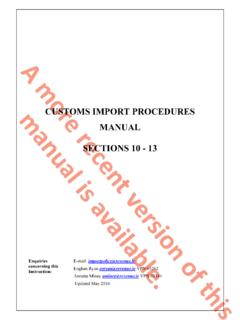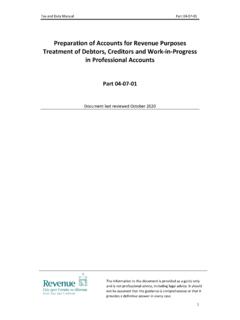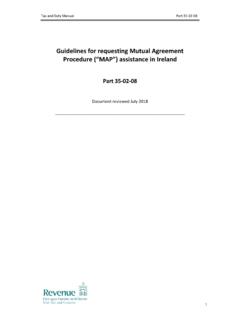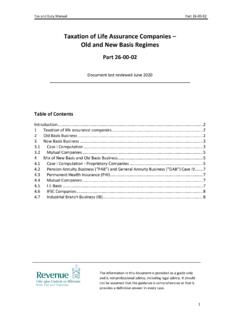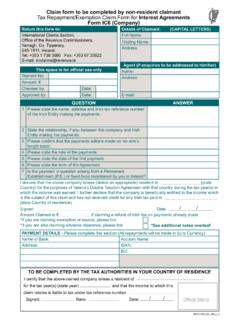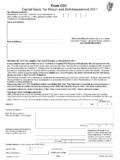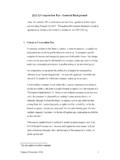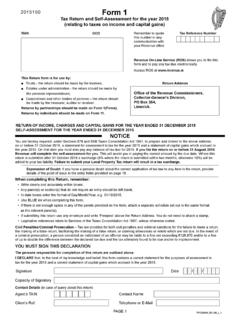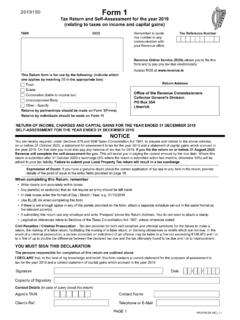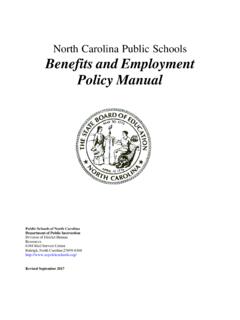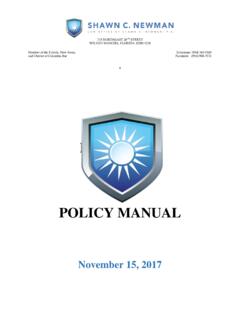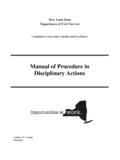Transcription of Part 07-01-27 - Exemption from income tax in respect of ...
1 Tax and Duty ManualPart 07-01-27 The information in this document is provided as a guide only and is not professional advice, including legal advice. It should not be assumed that the guidance is comprehensive or that it provides a definitive answer in every from income Tax in respect of Certain Payments made under employment LawPart 07-01-27 This document should be read in conjunction with section 192A Taxes Consolidation Act 1997 Document last updated May 2021 Tax and Duty ManualPart 07-01-272 Table of Contents - Relevant Act and Relevant of Court not covered by section 192A TCA Treatment of Legal 1 section 10 TCA 2 and Duty ManualPart 192A of the Taxes Consolidation Act 1997 (TCA 1997) provides for an Exemption from income tax in respect of certain awards made for infringement of an employee s rights or entitlements or an employer s obligations under employment legislation.
2 The Exemption applies to awards made on or after 4 February 2004. Section 192A TCA exempts from income tax compensatory awards made as a result of an employee s rights and entitlements in law having been infringed or breached through, for example, discrimination, harassment or victimisation. The Exemption applies to -(a)payments arising out of claims made under a relevant Act following a formal hearing before a relevant authority (or through a mediation process paragraph 2 below), on foot of a recommendation, decision or determination by that relevant authority, and(b)subject to certain conditions, payments made under an out of court settlement, in place of a formal hearing before a relevant authority, which has been agreed between an employee and his or her employer (see paragraph 4 below).
3 There are a number of examples set out in Appendix 2, which illustrate the operation of the legislation in respect of decisions/determinations/recommendations made by the Equality Tribunal, the employment Appeals Tribunal, the Workplace Relations Commission and the Labour and Duty ManualPart - Relevant Act and Relevant AuthorityRelevant ActA relevant Act means an enactment that contains provisions for (a)the protection of employees rights and entitlements, or(b)the obligations of employers towards employees. Examples of such legislation include: employment Equality Acts 1998-2015 Maternity Protection Acts 1994 and 2004 Equal Status Acts 2000-2015 Parental Leave Act 1998 Unfair Dismissals Acts 1977 - 2015 Carer s Leave Act 2001 Terms of employment (Information) Acts 1994 to 2014 Payment of Wages Act 1991 Protection of Young Persons ( employment ) Act 1996 Minimum Notice & Terms of employment Acts 1973 to 2005 Protection of Employees (Fixed-Term Work) Act 2003 Protection of Employees ( part -Time Work) Act 2001 Redundancy Payments Acts 1967 2014 Organisation of Working Time Act 1997 Protected Disclosures Act 2014 Tax and Duty ManualPart 07-01-275 Relevant authorityA relevant authority means any of the following:-a Rights Commissioner;-the Director of the Equality Tribunal.
4 -an adjudication officer of the Workplace Relations Commission;-the Workplace Relations Commission;-the District Court;-an employment Appeals Tribunal;-the Labour Court;-the Circuit Court; or-the High and Duty ManualPart The employment Equality Act 1998 - 2015 contains provisions that allow a dispute between an employee and an employer to be resolved through mediation. Where mediation results in an agreement acceptable to both parties, the Mediator draws up the terms of settlement for signature by both parties. A payment made by an employer in accordance with such a settlement may be treated as a payment made on foot of a recommendation, decision or determination by a relevant authority for the purposes of the agreed order made by the Circuit Court may also be regarded as a recommendation, decision or determination for the purposes of the and Duty ManualPart of Court SettlementsMany disputes between employees and employers concerning the infringement of employees rights and entitlements or employers obligations to employees are settled by agreement without referral to a relevant authority.
5 A payment made under such an agreement also qualifies for the Exemption where all of the following conditions are met the agreement in settlement of a claim is evidenced in writing; the original statement of claim by the employee is evidenced in writing; the agreement is not between connected persons as defined in section 10 of the TCA 1997 ( employer and relative, employer and director see Appendix 1 for copy of section 10 TCA 1997); the claim would have been a bona fide claim under a relevant Act had it been made to a relevant authority ( sufficient grounds for the claim; claim is within the scope of one of the relevant Acts; claim made within specified time limits, etc.); the claim is likely to have been the subject of a recommendation, decision or determination by a relevant authority that a payment be made to the person making the claim; the payment does not exceed the maximum amount which could have been awarded under relevant legislation by the Rights Commissioner, Director of the Equality Tribunal, employment Appeals Tribunal, Workplace Relations Commission or Labour Court as appropriate ( a claim made under the employment Equality Act 1998 for acts of discrimination maximum amount cannot exceed a sum calculated as being not greater than 104 weeks pay).
6 Tax and Duty ManualPart 07-01-278 Note -The relevant employment legislation is available on the Irish Statute Book website. Employers are obliged to retain copies of any such agreements together with the employees statements of claims for a period of six years from the date the payment was made, and to make these documents available to any officer of the Revenue Commissioners when requested to do so. The format of the employee s original statement of claim, which must be evidenced in writing, and the details to be included in same, will vary depending on the facts and circumstances of each individual case. However, such written documentation may reasonably be expected to include information such as the nature of the claim, the nature of the relationship between the parties involved or a high-level summary of the allegations and the impact of same.
7 The employee need not engage an external advisor to prepare such written documentation on their behalf and there is no requirement for the statement of claim to have been formally submitted to a relevant Authority, provided all other conditions set out above are is no obligation on employers to look for advance approval of Exemption under section 192A TCA 1997 in respect of out of court settlements. However, where an employer does seek such an approval, a copy of the agreement and statement of the employee s claim should be sought and examined before granting the Exemption , if due. Tax and Duty ManualPart not covered by section 192A TCA 1997In general, a distinction can be made between salary/wages, including arrears of same (which are taxable) and compensation for a wrong done which is quantified by reference to salary/wages.
8 For example, compensation in respect of claim under employment related law relating to harassment, which may qualify for the tax Exemption , may be quantified as being not more than, say, 26 weeks wages. More specifically, the Exemption does NOT APPLY to a payment (however described) in respect of:(a)actual remuneration or arrears of remuneration (chargeable to tax under section 112 TCA 1997) arising from a claim under a relevant Act , for example, arising from - the non-payment of wages ( a payment in respect of a claim under the Organisation of Working Time Act 1997 for holiday pay). the payment of insufficient wages ( arrears of remuneration arising from a claim for equal pay under the employment Equality Acts 1998 - 2015);(b)the termination of an office or employment (chargeable to tax under section 123 TCA 1997).
9 For example, a payment in respect of a claim made under the Unfair Dismissals Acts 1977 - 2015; (c)compensation for a reduction or possible reduction in future remuneration arising from a reorganisation of a business or changes in work procedures, work methods, or a change of location where the duties of the employment are (chargeable under section 112 TCA 1997 but subject to relief under section 480 TCA 1997); (d)compensation under a court order under section 2B of the employment Permits Act and Duty ManualPart 07-01-2710In considering if the Exemption provided for in section 192A TCA 1997 applies in respect of out-of-court settlements, due regard must be had to all terms and clauses included within any written agreement between the parties involved. This includes any terms which attribute or apportion the payment between different elements of the claim as set out above.
10 Where the agreement does not clearly attribute the payment to any specific element of the claim, the classification and consequential tax treatment of same must be determined having due regard to the full facts and circumstances of the case and the terms of the agreement reached between the parties. 6. Tax Treatment of Legal FeesComprehensive guidance is set out in Tax and Duty manual part and Duty ManualPart 07-01-2711 Appendix 1 section 10 TCA 1997 Section 10 TCA 1997 Definition of Connected Persons Connected persons10. (1) In this section-"close company" has the meaning assigned to it by sections 430 and 431;"company" has the same meaning as in section 4 (1);"control" shall be construed in accordance with section 432;"relative" means brother, sister, ancestor or lineal descendant and, for the purposes of the Capital Gains Tax Acts, also means uncle, aunt, niece or nephew;"settlement" includes any disposition, trust, covenant, agreement or arrangement, and any transfer of money or other property or of any right to money or other property.

